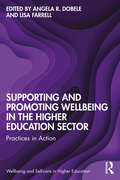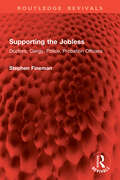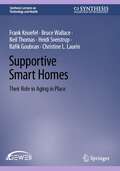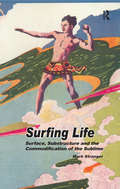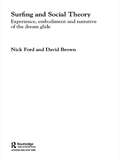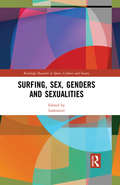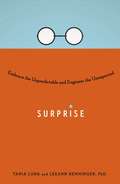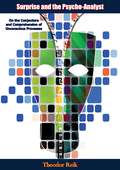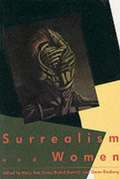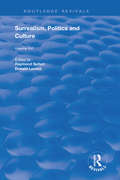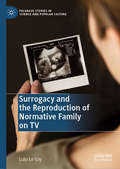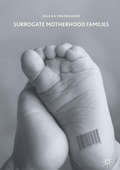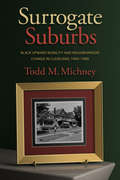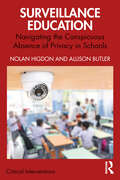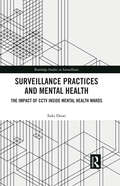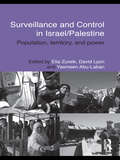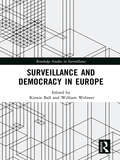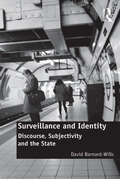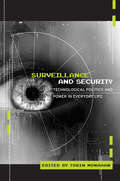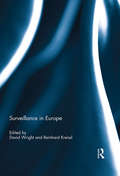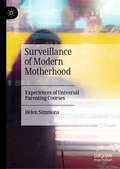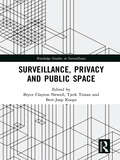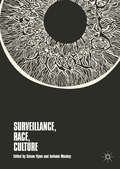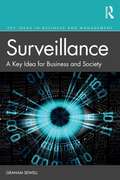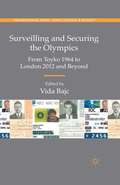- Table View
- List View
Supporting and Promoting Wellbeing in the Higher Education Sector: Practices in Action (Wellbeing and Self-care in Higher Education)
by Lisa Farrell Angela R. DobeleThis book provides innovative, practical tools to help combat declining personal wellbeing in the higher education workplace.Divided into two sections, the book looks at wellbeing from institutional and individual levels. It outlines a framework for how wellbeing in the higher education workplace can be evaluated and clearly sets out initiatives for what can be done to improve faculty wellbeing. The book also explores issues such as the once vocational nature of academia, the extent to which institutions can provide allied health care and examines initiatives that individual faculty members have introduced for themselves.Representing new ideas, perspectives and a variety of approaches to supporting and promoting wellbeing in the higher education workplace, this book will be of interest to academic staff as well as professional development personnel in higher education.
Supporting the Jobless: Doctors, Clergy, Police, Probation Officers (Routledge Revivals)
by Stephen FinemanThe problems of unemployment soon reach the desks and consulting rooms of professional helpers. But, when joblessness is the ‘social disease’, what role is there for the professional who sees the symptoms but cannot offer the cure—a job? Stephen Fineman in his book Supporting the Jobless (first published in 1990) reveals, through a sensitive portrait of their lives and dilemmas, the sense of crisis that these professionals feel in the face of unemployment.The book covers four professions—medicine, specifically general practice; the clergy; the police; and the probation service. They represent the spectrum of social care provision and very different professional and organizational cultures. The author looks closely at how helpers respond to their jobless clients. Some cling to vestiges of their traditional professionalism, while others try to develop more effective support, only to encounter rigid professional restraints intent on self-protection. The author considers whether professionals are flexible enough to overcome these restraints and change their practice and organization to respond to their clients’ needs.This volume is a practical and accessible study of the human cost of unemployment from the professionals’ viewpoint. Based on detailed research and case studies, it offers unusual accounts of joblessness to students of sociology, social psychology, and management. It gives professionals constructive suggestions for improving the service they offer clients who find themselves out of work.
Supportive Smart Homes: Their Role in Aging in Place (Synthesis Lectures on Technology and Health)
by Neil Thomas Bruce Wallace Frank Knoefel Heidi Sveistrup Rafik Goubran Christine L. LaurinSignificant health-industry human resource needs increase the reliance on family and friends to support older adults hoping to age in place. This book explores how recent improvements in integrated home technologies have the potential to address those challenges. The book considers how embedded home sensors can be used to monitor the health and wellbeing of older adults and how that can be used to assist with supporting safety and well-being. The content is designed to help multiple stakeholders in the supportive smart home space to better understand the complexity of this field and the need for transdisciplinary collaboration. These stakeholders include the older adults who will benefit from supportive smart home technology; informal and formal caregiver and healthcare professionals concerned about the older adult’s well-being; researchers from multiple disciplines in the supportive smart home area and their funders; companies looking to develop solutions and services or expand their offerings; policy makers who want to ensure privacy and equity in access and a successful integration of these technologies into the evolving health and social services sectors; and students, the future leaders in AgeTech. Overall, the intent of the book is to inspire engineers, computer scientists, industrial designers, clinicians and healthcare providers, social scientists, students, policy makers, and older adults and their caregivers to collaborate in advancing the supportive smart home space to develop more options for aging in place.
Surfing Life: Surface, Substructure and the Commodification of the Sublime
by Mark StrangerSurfing Life is a study of surfing and social change that also provides insights into other experience-based contemporary subcultures and the nature of the self and social formations in contemporary society. Making use of extensive empirical material to support innovative theoretical approaches to social change, this book offers an analysis of the relationship between embodied experience, culture and the economy. With its ground breaking theoretical contributions, and its foundation in an ethnographic study of surfing culture in locations across Australia, this volume will appeal not only to those interested in the social and cultural phenomenon of surfing, but also to anyone interested in the sociology of sport and leisure, the sociology of culture and consumption, risk-taking, subcultures and theories of contemporary social change.
Surfing and Social Theory: Experience, Embodiment and Narrative of the Dream Glide
by David Brown Nicholas J FordSurfing has emerged from ancient roots to become a twenty-first century phenomenon – an ‘alternative’ sport, lifestyle and art form with a global profile and ever-increasing numbers of participants. Drawing on popular surf culture, academic literature and the analytical tools of social theory, this book is the first sustained commentary on the contemporary social and cultural meaning of surfing. Core themes of mind and body, emotions and identity, aesthetics, style, and sensory experience are explored through a variety of topics, and particular attention is paid to: * evolving perceptions of the sea and the beach * the globalization of surfing * surfing as a subculture and lifestyle * the embodiment and gendering of surfing. Surfing and Social Theory is an original and theoretically rigorous text that sets the agenda for future work in this area. Along with the Surf Science courses now appearing in universities around the world, this text provides students and researchers in sport, sociology, culture and geography with a new perspective and a thought-provoking text.
Surfing, Sex, Genders and Sexualities (Routledge Research in Sport, Culture and Society)
by LisahunterSex, gender and sexuality have played an important role in shaping the culture of surfing and are central themes in the study of sport and movement cultures. Rooted in a rich precolonial history, surfing has undergone a modern transformation shaped by visual culture, commodification, sportization, mediatization and globalization, arguably all linked to sex, gender and sexuality. Using the physical culture of surfing as its focus, this international collection discusses the complex relationships between surfing, sex/es, gender/s and sexuality/ies. This book crosses new theoretical, empirical and methodological boundaries by exploring themes and issues such as indigenous histories, exploitation, the marginalized, race, ethnicity, disability, counter cultures, transgressions and queering. Offering original insights into surfing’s symbolism, postcolonialism, patriocolonial whiteness and heteronormativity, its chapters are connected by a collective aspiration to document sex/es, gender/s and sexuality/ies as they are shaped by surfing and, importantly, as they re-shape the many, possibly previously unknown, worlds of surfing. Surfing, Sex, Genders and Sexualities is fascinating reading for anybody with an interest in the sociology of sport or gender and sexuality studies.
Surprise
by Leeann Renninger Tania LunaSurprise: Embrace the Unpredictable and Engineer the Unexpected is a fascinating look at how we can handle and harness surprise in our work, relationships, and everyday lives. Pop Quiz! Do you prefer when:A) Things go according to plan?B) When the unexpected happens? Most of us pick control and predictability. Yet research reveals a counterintuitive truth: surprise is the key that unlocks growth, innovation, and connection. It is also the secret ingredient in our best memories. Through colorful narratives and compelling scientific findings, authors Tania Luna and Dr. LeeAnn Renninger shine a light on the world's least understood and most intriguing emotion. They reveal how shifting our perception of surprise lets us thrive in the face of uncertainty. And they show us how surprise acts as a shortcut that turns a typical product into a meaningful experience, a good idea into a viral one, awkward small talk into engaging conversation, and daily life into an adventure.From the Hardcover edition.ng our perception of surprise lets us thrive in the face of uncertainty. And they show us how surprise acts as a shortcut that turns a typical product into a meaningful experience, a good idea into a viral one, awkward small talk into engaging conversation, and everyday life into an adventure.
Surprise and the Psycho-Analyst: On the Conjecture and Comprehension of Unconscious Processes
by Theodor ReikWritten in 1936, this book seeks to describe what is required of an investigator into the unconscious mental processes of another person, and what he achieves. By describing the psychological process of cognition from within, the author intends at the same time to trace the way from conjecturing to comprehending the unconscious processes.-Print ed.“The author describes his book as an attempt to set forth "What is required of an investigator into the unconscious mental processes of another person, and what he achieves." In fact the scope of the book is wider than this might suggest, for it makes a good many incursions into the fields of general psychological method and principle both normal and abnormal. Some of the topics dealt with are wit; tact, time and rhythm; memory and reminiscence; conjecture and comprehension; the ego mechanism; anticipation. The general thesis of the book is that when the true route of analysis and interpretation is followed there must be somewhere near the beginning always an experience of shock or surprise. This and its significance are fully discussed and illustrated by a mass of original observations.”-American Psychological Association.
Surrealism and Women
by Gwen Raaberg Marry Ann Caws Rudolf E. KuenzliThese sixteen essays present an important revision of surrealism by focusing on the works of women surrealists and their strategies to assert positions as creative subjects within a movement that regarded woman primarily as an object of masculine desire or fear. While the male surrealists attacked aspects of the bourgeois order, they reinforced the traditional patriarchal image of woman. Their emphasis on dreams, automatic writing, and the unconscious reveal some of the least inhibited masculine fantasies. <p><p>The first resistance to the male surrealists' projection of the female figure arose in the writings and paintings of marginalized woman artists and writers associated with Surrealism. The essays in this collection explore the complexity of these women's works, which simultaneously employ and subvert the dominant discourse of male surrealists.
Surrealism, Politics and Culture (Studies In European Cultural Transition)
by Martin Stannard Greg Walker Raymond Spiteri Donald LaCossThis title was first published in 2003. Drawing on literary, art historical and historical studies, this essay collection explores the complex encounter between culture and politics within Surrealism. The Surrealist movement was one of the first cultural movements to question explicitly the relation between culture and politics, and its attempt to fuse social and cultural revolution has been a critical factor in shaping our sense of modernity. This anthology addresses not only the contested ground between culture and politics within Surrealism itself, and within the subsequent historical accounts of the movement, but also the broader implications of this encounter on our own sense of modernity. Its goal is to delineate the role of radical politics in shaping the historical trajectory of Surrealism.
Surrogacy and the Reproduction of Normative Family on TV (Palgrave Studies in Science and Popular Culture)
by Lulu Le VayThis book examines the proliferation of surrogacy storylines on TV, exploring themes of infertility, motherhood, parenting and family. It investigates how, despite reproductive technologies’ ability to flex contours of family, the shows’ narratives work to uphold the white, heterosexual, genetically-reproduced family as the ideal. In dialogue with responses from a range of female viewers, both mothers and non-mothers, the book scrutinises the construction of family ideology on television with studies including Coronation Street (1960-present), Giuliana & Bill (2009-2014), Rules of Engagement (2007-2013), The New Normal (2012-2013), Top of the Lake: China Girl (2017) The Handmaid’s Tale (2017-present) and film Baby Mama (2008). These studies raise a number of questions; is homosexuality only acceptable when it echoes heterosexual norms? Are female characters only fulfilled when they are genetic mothers? Does heterosexual romance override technology in the cure for infertility? While the answers to these questions may suggest that television still conforms to heteronormative narratives, this book importantly demonstrates that audiences desire alternative happy endings that show infertile female characters more positively and recognise alternative kinship formations as meaningful.
Surrogate Motherhood Families
by Olga B.A. van den AkkerThis comprehensive book covers the research, theory, policy and practice context of unusual reproduction using third parties. Olga Van den Akker details the psychological adaptation required to continuing changes in public opinion, advances in technologies and new legislations in surrogate motherhood and discusses their impact at an individual, societal and global level. She describes the competing interests and interactions between legal, organisational, personal, social, psychological and cultural issues in relation to biological and genetic surrogate and commissioning parenthood. This book is intended for professionals, practitioners, academics and students interested in the complexities of unusual reproduction using multidisciplinary perspectives.
Surrogate Suburbs: Black Upward Mobility and Neighborhood Change in Cleveland, 1900–1980
by Todd M. MichneyThe story of white flight and the neglect of black urban neighborhoods has been well told by urban historians in recent decades. Yet much of this scholarship has downplayed black agency and tended to portray African Americans as victims of structural forces beyond their control. In this history of Cleveland's black middle class, Todd Michney uncovers the creative ways that members of this nascent community established footholds in areas outside the overcrowded, inner-city neighborhoods to which most African Americans were consigned. In asserting their right to these outer-city spaces, African Americans appealed to city officials, allied with politically progressive whites (notably Jewish activists), and relied upon both black and white developers and real estate agents to expand these "surrogate suburbs" and maintain their livability until the bona fide suburbs became more accessible.By tracking the trajectories of those who, in spite of racism, were able to succeed, Michney offers a valuable counterweight to histories that have focused on racial conflict and black poverty and tells the neglected story of the black middle class in America's cities prior to the 1960s.
Surveillance Education: Navigating the Conspicuous Absence of Privacy in Schools (Critical Interventions)
by Nolan Higdon Allison ButlerSurveillance Education explores the pervasive use of digital surveillance technologies in schools and assesses its pernicious effects on students. Recognizing that the use of digital technologies will persist, the authors instead offer practical ways to ameliorate their impact.In our era of surveillance capitalism, digital media technologies are ever more intertwined into the educational process. Schools are presented with digital technologies as tools of convenience for gathering and grading student work, as tools of support to foster a more equitable learning environment, and as tools of safety for predicting or preventing violence or monitoring mental, emotional, and physical health. Despite a dearth of evidence to confirm their effectiveness, digital data collection and tracking is often presented as a way to improve educational outcomes and safety. This book challenges these fallacious assumptions and argues that the use of digital media technologies has caused great harm to students by subjecting them to oppressive levels of surveillance, impinging upon their right to privacy, and harvesting their personal data on behalf of Big-Tech. In doing so, the authors draw upon interviews from K–12 and higher education students, teachers, and staff, civil rights and technology lawyers, and educational technological programmers. The authors also provide practical guidance for teachers, administrators, students, and their families seeking to identify and combat surveillance in education.This urgent, eye-opening book will be of interest to students and educators with interests in critical media literacy and pedagogy and the sociology of technology and education.
Surveillance Practices and Mental Health: The Impact of CCTV Inside Mental Health Wards (Routledge Studies in Surveillance)
by Suki DesaiThis book examines how CCTV cameras expose the patient body inside the mental health ward, especially the relationship between staff and patients as surveillance subjects. A key aspect of the book is that existing surveillance literature and mental health literature have largely ignored the influence of CCTV cameras on patient and staff experiences inside mental health wards. Research findings for this book suggest that camera use inside mental health wards is based on a perception of the violent nature of the mental health patient. This perception not only influences ethical mental health practice inside the ward but also impacts how patients experience the ward. It is not known how and why CCTV camera use has expanded to its uses inside mental health wards. These include not only communal areas of the ward but also patient bedrooms. The research, therefore, examines how and why camera technology was introduced inside three Psychiatric Intensive Care Mental Health Units located in England, UK. Aimed at both undergraduate and postgraduate students, this book will appeal to sociology, mental health, and surveillance studies students, as well as practitioners in mental health nursing, caseworkers and social caregivers.
Surveillance and Control in Israel/Palestine: Population, Territory and Power (Routledge Studies in Middle Eastern Politics)
by Elia ZureikSurveillance is always a means to an end, whether that end is influence, management or entitlement. This book examines the several layers of surveillance that control the Palestinian population in Israel and the Occupied Territories, showing how they operate, how well they work, how they are augmented, and how in the end their chief purpose is population control. Showing how what might be regarded as exceptional elsewhere is here regarded as the norm, the book looks not only at the political economy of surveillance and its technological and military dimensions, but also at the ordinary ways that Palestinians in Israel and the occupied territories are affected in their everyday lives. Written in a clear and accessible style by experts in the field, this book will have large appeal for academic faculty as well as graduate and senior undergraduate students in sociology, political science, international relations, surveillance studies and Middle East studies.
Surveillance and Democracy in Europe: Courting Controversy? (Routledge Studies in Surveillance)
by Kirstie Ball William WebsterMany contemporary surveillance practices take place in information infrastructures which are from the public domain. Although they have far reaching consequences for both citizens and their rights, they are not always subject to regulatory demands and oversight. This being said, democratic fora where citizens and institutions may question such practices cannot be mobilised without widespread awareness of the dangers and consequences of surveillance practices and who is responsible for them. Through an analysis of surveillance controversies across Europe, this book not only examines the troublesome relationship between surveillance and democracy; but also highlights the vested interests which maintain the status quo. Using a participatory theory lens, Surveillance and Democracy in Europe reveals the historical, social, political and legal antecedents of the current state of affairs. Arguing that participation is a sensitising concept which enables a wide array of surveillance practices and processes to be interrogated, this insightful volume will appeal to students and researchers interested in fields such as public administration and policy, political studies, organisational behaviour and surveillance and privacy.
Surveillance and Identity: Discourse, Subjectivity and the State
by David Barnard-WillsSurveillance and Identity analyses the discourse of surveillance in the contemporary United Kingdom, drawing upon public language from central government, governmental agencies, activist movements, and from finance and banking. Examining the logics of these discourses and revealing the manner in which they construct problems of governance in the light of the insecurity of identity, this book shows how identity is fundamentally linked to surveillance, as governmental discourses privilege surveillance as a response to social problems. In drawing links between new technologies and national surveillance projects or concerns surrounding phenomena such as identity fraud, Surveillance and Identity presents a new understanding of identity - the model of 'surveillance identity' - demonstrating that this is often applied to individuals by powerful organisations at the same time as the concept is being actively contested in public language. The first comprehensive study of the discursive politics of surveillance in the UK, this book makes significant contributions to surveillance theory, governmentality theory, and to political and social identity theories. As such, it will be of interest to social scientists of all kinds working on questions of public discourse and political communication, identity, surveillance and the relationship between the individual and the state.
Surveillance and Security: Technological Politics and Power in Everyday Life
by Torin MonahanThis is a volume of original contributions from scholars in eight different humanities and social science disciplines. The aim of the book is to present a range of surveillance technologies used in everyday life and investigate the politics of their use. It is truly an interdisciplinary project that will find purchase in courses on security studies and the sociology of culture and the sociology of science. Courses on security studies and its impact on culture can be found in a variety of academic departments including STS, criminology, sociology, women's studies, anthropology, political science and justice studies.
Surveillance in Europe
by David Wright Reinhard KreisslSurveillance in Europe is an accessible, definitive and comprehensive overview of the rapidly growing multi-disciplinary field of surveillance studies in Europe. Written by experts in the field, including leading scholars, the Companion’s clear and up to date style will appeal to a wide range of scholars and students in the social sciences, arts and humanities. This book makes the case for greater resilience in European society in the face of the growing pervasiveness of surveillance. It examines surveillance in Europe from several different perspectives, including: the co-evolution of surveillance technologies and practices the surveillance industry in Europe the instrumentality of surveillance for preventing and detecting crime and terrorism social and economic costs impacts of surveillance on civil liberties resilience in Europe’s surveillance society. the consequences and impacts for Europe of the Snowden revelations findings and recommendations regarding surveillance in Europe Surveillance in Europe's interdisciplinary approach and accessible content makes it an ideal companion to academics, policy-makers and civil society organisations alike, as well as appealing to top level undergraduates and postgraduates.
Surveillance of Modern Motherhood: Experiences of Universal Parenting Courses
by Helen SimmonsThis book explores the reflections and experiences of mothers of children aged 0-3 years that have attended universal parenting courses. Simmons considers the factors that motivated mothers to attend a universal parenting course and explore the wider experiences of early modern motherhood in the UK. She investigates participants' perceptions of benefits of attending a parenting course, different forms of parenting advice accessed by mothers, and how this provides an insight into the wider constructs and experiences of modern motherhood. Ultimately, the book considers, through a feminist post-structuralist lens, the social and cultural pressures within modern motherhood in relation to different levels of surveillance, and produces new knowledge for practice within the early years and health sectors in relation to the support currently offered to new mothers. It will be of interest to students and scholars across the sociology of education, gender studies, and childhood studies.
Surveillance, Privacy and Public Space (Routledge Studies in Surveillance)
by Bert-Jaap Koops Bryce Clayton Newell Tjerk TimanToday, public space has become a fruitful venue for surveillance of many kinds. Emerging surveillance technologies used by governments, corporations, and even individual members of the public are reshaping the very nature of physical public space. Especially in urban environments, the ability of individuals to remain private or anonymous is being challenged. Surveillance, Privacy, and Public Space problematizes our traditional understanding of ‘public space’. The chapter authors explore intertwined concepts to develop current privacy theory and frame future scholarly debate on the regulation of surveillance in public spaces. This book also explores alternative understandings of the impacts that modern living and technological progress have on the experience of being in public, as well as the very nature of what public space really is. Representing a range of disciplines and methods, this book provides a broad overview of the changing nature of public space and the complex interactions between emerging forms of surveillance and personal privacy in these public spaces. It will appeal to scholars and students in a variety of academic disciplines, including sociology, surveillance studies, urban studies, philosophy, law, communication and media studies, political science, and criminology.
Surveillance, Race, Culture
by Susan Flynn Antonia MackayThis collection of essays engages with a wide range of disciplines including art, performance, film and literature, to examine the myriad effects of contemporary surveillance on our cultural psyche. The volume expertly articulates the manner in which cultural productions have been complicit in watching, seeing and purporting to ‘know’ race. In our increasingly mediated world, our sense of community is becoming progressively virtual, and surveillant technologies impact upon subjectivity, resulting in multiple forms of artistic and cultural expression. As such, art, film, and literature provide a lens for the reflection of sociocultural concerns. In Surveillance, Race, Culture Flynn and Mackay skilfully draw together a diverse range of contributions to investigate the fundamental question of exactly how surveillant technologies have informed our notions of race, identity and belonging.
Surveillance: A Key Idea for Business and Society (Key Ideas in Business and Management)
by Graham SewellBeing watched and watching others is a universal feature of all human societies. How does the phenomenon of surveillance affect, interact with, and change the world of business? This concise book unveils a key idea in the history and future of management. For centuries managers have claimed the right to monitor employees, but in the digital era, this management activity has become enhanced beyond recognition. Drawing on extensive research into organizational surveillance, the author distils and analyses existing thinking on the concept with his own empirical work. Drawing together perspectives from philosophy, cutting-edge social theory, and empirical research on workplace surveillance, Surveillance is the definitive introduction to an intriguing topic that will interest readers across the social sciences and beyond.
Surveilling and Securing the Olympics: From Tokyo 1964 to London 2012 and Beyond (Transnational Crime, Crime Control and Security)
by Vida BajcThis book analyses the relationship between the Olympic Games, with its ethos of openness and collectivism, and the security concerns and surveillance technologies that are becoming increasingly prevalent in the organisation of public events.
